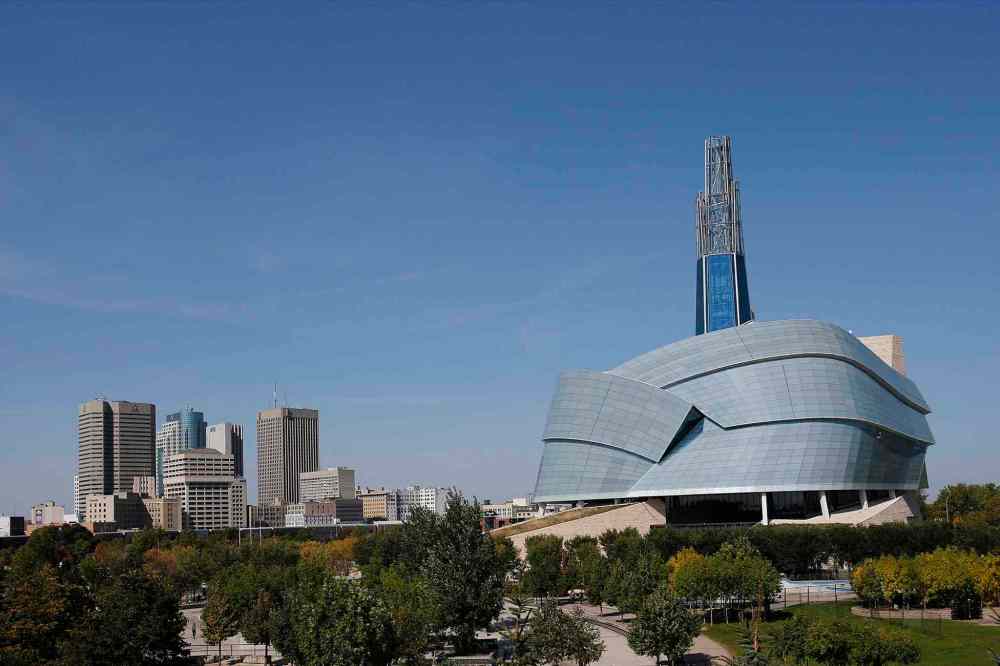Fires near CMHR draw attention to aboriginal issues
Advertisement
Read this article for free:
or
Already have an account? Log in here »
To continue reading, please subscribe:
Monthly Digital Subscription
$0 for the first 4 weeks*
- Enjoy unlimited reading on winnipegfreepress.com
- Read the E-Edition, our digital replica newspaper
- Access News Break, our award-winning app
- Play interactive puzzles
*No charge for 4 weeks then price increases to the regular rate of $19.95 plus GST every four weeks. Offer available to new and qualified returning subscribers only. Cancel any time.
Monthly Digital Subscription
$4.99/week*
- Enjoy unlimited reading on winnipegfreepress.com
- Read the E-Edition, our digital replica newspaper
- Access News Break, our award-winning app
- Play interactive puzzles
*Billed as $19.95 plus GST every four weeks. Cancel any time.
To continue reading, please subscribe:
Add Free Press access to your Brandon Sun subscription for only an additional
$1 for the first 4 weeks*
*Your next subscription payment will increase by $1.00 and you will be charged $16.99 plus GST for four weeks. After four weeks, your payment will increase to $23.99 plus GST every four weeks.
Read unlimited articles for free today:
or
Already have an account? Log in here »
Hey there, time traveller!
This article was published 18/09/2014 (4124 days ago), so information in it may no longer be current.
Smoke from two sacred aboriginal wood fires will drift over opening ceremonies at the Canadian Museum for Human Rights at The Forks this weekend.
On the north side, a fire is burning for ceremonial purposes to mark the plight of aboriginal peoples in Canada, which many aboriginal people now openly call a form of government-sponsored genocide. The clutch of people there discouraged media scrutiny Friday.
On the south side, a second fire is the site of a peaceful demonstration over the value of water and the contradictions critics see in federal support for the new monument to civil rights.

Sponsored by a coalition of environmental and aboriginal groups including the Council of Canadians, the Wilderness Committee and Amnesty International, the fire is symbolic of federal neglect to ensure safe drinking water on First Nations and additional federal measures to relax laws that once protected waterways under federal jurisdiction, organizers said.
“What we want to do is draw attention to the use of water in the museum. They’re using it in Garden of Contemplation (a gallery) and the intention is on reflection and healing. Yet the Canadian government doesn’t give everyone equal access to water… and their responsibility for water at an environmental level shows an incredible contradiction,” said Ashlyn Haglund, advocacy co-ordinator for Pimichikamak First Nation.
Boil water advisories are currently in effect in 1,219 Canadian communities including 136 in Manitoba.
Many of the advisories are related to water contamination that can be traced to resource and hydro development in the north, Haglund said.
‘Shrine to hypocrisy’: Shoal Lake leader
In Winnipeg, the issue of water is lightning rod for First Nations on Shoal Lake, the source of the city’s drinking water. Leaders from Shoal Lake 40 will attend events in Winnipeg this weekend.
A century ago, Shoal Lake 40, one of the two First Nations negotiating currently with the city for compensation, was cut off from the mainland with the construction of an aqueduct and a canal system to carry fresh water to the city. Efforts to build a road 27 kilometres to the nearest highway to reconnect the community to the mainland have made progress with the province and the city, but the final segment of the road — comprising a third of the route — is hung up in talks with Ottawa.
Friday, the chief of Shoal Lake 40 gestured to the museum for human rights and called it a “shrine to hypocrisy ” for his people: Ottawa helped fund the museum but it won’t help build a road at Shoal Lake, Chief Erwin Redsky said.
“If you come to our community, you’ll see that hypocrisy for yourself. Here, they claim to be the museum for human rights. We’re creating our own museum, a real-life museum with real people. You’ll see the poverty. That’s not what we envisioned when we signed treaty, ” Redsky said.
Redsky and a handful of Shoal Lake residents are manning the sacred fire until Sunday morning to raise their community’s profile.
“What we are trying to say is there’s two ends of this pipe, the water pipe from my community to this city. On this end there’s prosperity, all the good stuff. On our end our community is slowly dying. It’s been cut off from the rest of the world for 100 years,” said band consultant Daryl Redsky.
“We just want to be able to enjoy the same opportunities as everybody else.”
History
Updated on Friday, September 19, 2014 5:56 PM CDT: Corrects Ashlyn Haglund's title






